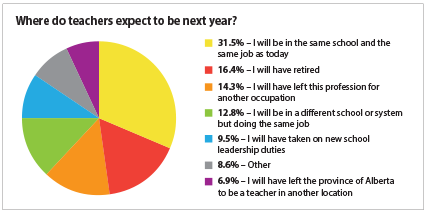Page Content
Stress and frustration levels remain high, survey finds
The Alberta Teachers’ Association completed its sixth pandemic pulse study at the end of November 2021 with responses from a random sample of more than 1,300 K–12 Alberta teachers and school leaders. Here is a summary of some of the most noteworthy findings.
1. Teacher attrition
Over one-third (37%) of respondents reported that they likely won’t be teaching in Alberta next year. The proportion of respondents reporting that they will leave the teaching profession for another occupation has doubled since the annual Member Opinion Survey was conducted in March 2021. Retirement data remains similar.
Highlights:
- 16% will have retired
- 14% will leave the profession for another occupation
- 7% will leave the province of Alberta to teach in another location
2. Well-being
Stress continues to be very high for teachers, at 88% within the overall sample, breaking down to 54% strongly agreeing and 34% in general agreement with the statement “I feel stressed.”
Fatigue is also extreme at 92% within the overall sample, breaking down to 69% strongly agreeing and 23% in general agreement with the statement “I feel exhausted by the end of the day.”
Anxiety remains at levels seen in the spring 2021 sample, with 51% overall reporting they are “feeling nervous, anxious or on edge” more than half of the days of the week (22%) or nearly every day (29%).
Depression also remains at levels seen in the spring 2021 sample, with 36% overall reporting they are “feeling down, depressed or hopeless” more than half of the days of the week (18%) or nearly every day (18%).
Of significant concern is that “hopelessness” sits at 45% within the overall sample, breaking down to 13% strongly disagreeing and 32% in general disagreement with the statement “I feel hopeful.”
When asked, “What is one word that describes how you are feeling at this moment?” participant responses clustered around the following words: tired, overwhelmed, disappointed.
3. Class size and composition
Class composition is an issue for 85% of the respondents when compared to last year. Specifically, class complexity and diversity of student needs (e.g., socio-economic, linguistic, behavioural, cognitive, social/emotional) has significantly increased (52%) and somewhat increased (33%) from last year. We note that 27% of respondents indicate that their class sizes are more than 30 students.
4. Contact tracing
Over 80% of the school leaders in the sample reported that they have had to directly contact (trace) families as part of a COVID-19 exposure. Only 22% report they are comfortable doing this work. The other 78% report varying levels of discomfort, with 21% saying they are extremely uncomfortable doing this work. ❚

